Ask a question from expert
Unit 12: Organisational Behaviour Assignment
27 Pages6019 Words3059 Views
Added on 2020-06-19
Unit 12: Organisational Behaviour Assignment
Added on 2020-06-19
BookmarkShareRelated Documents
Organisational BehaviourTABLE OF CONTENTS
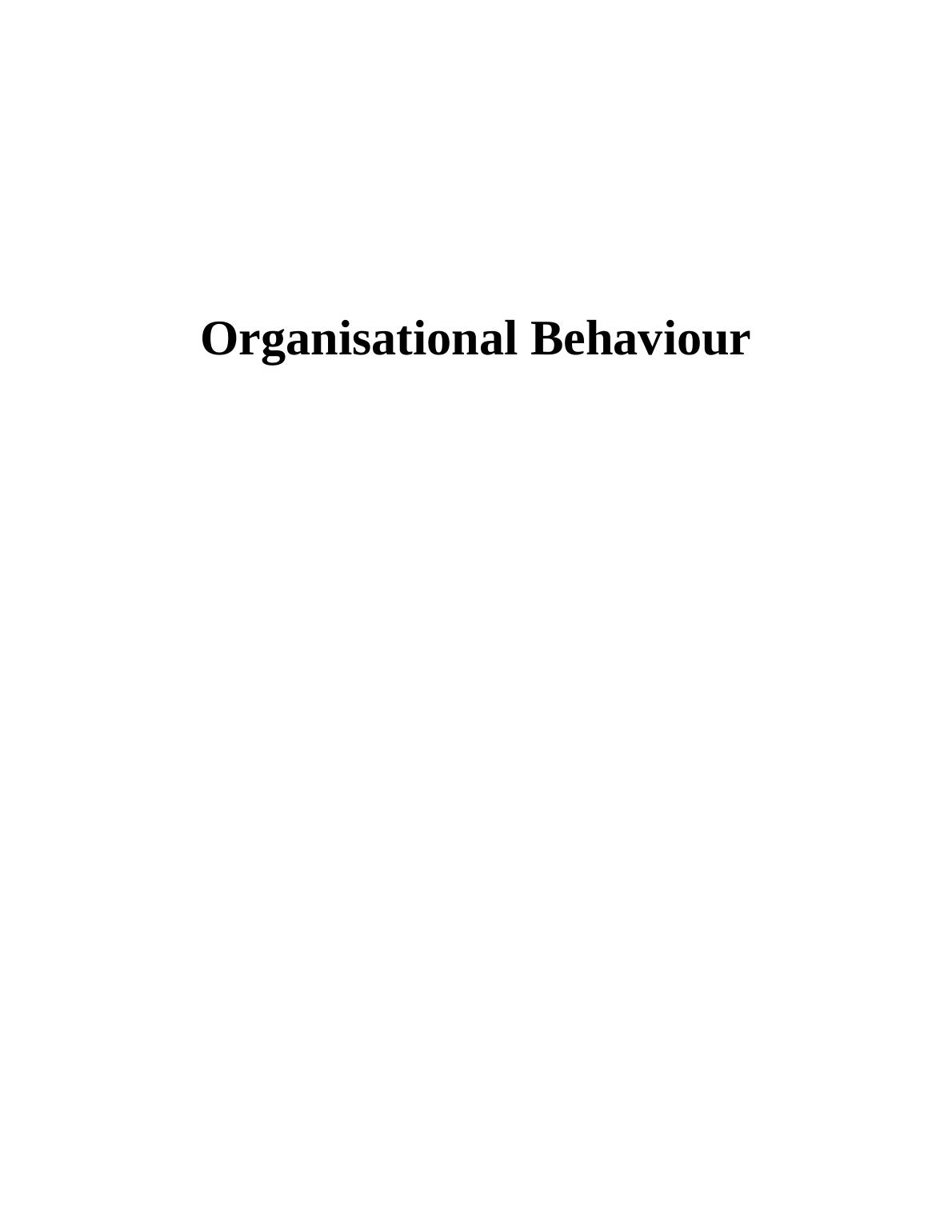
Introduction1LO12Analyze how an organisation’s culture, politics and power influence individual and teambehaviour and performance.2Critically analyze how the culture, politics and power of an organisation can influenceindividual and team behaviour and performance.5LO27Evaluate how content and process theories of motivation and motivational techniques enableeffective achievement of goals in an organisational context.7Critically evaluate how to influence the behaviour of others through the effective applicationof behavioural motivational theories, concepts and models.9Critically evaluate the relationship between culture, politics, power and motivation thatenables team and your chosen organisation to succeed. Providing justified recommendations9LO311Explain what makes an effective team as opposed to an ineffective team.11Analyze relevant team and group development theories to support the development ofdynamic cooperation.13LO416Apply concepts and philosophies of organisational behaviour within an organisational contextand a given business situation.16Explore and evaluate how concepts and philosophies of OB inform and influence behaviour inboth a positive and negative way.18Evaluate the relevance of team development theories in the context of OB concepts andphilosophies that influence behaviour in the workplace.18Conclusion20
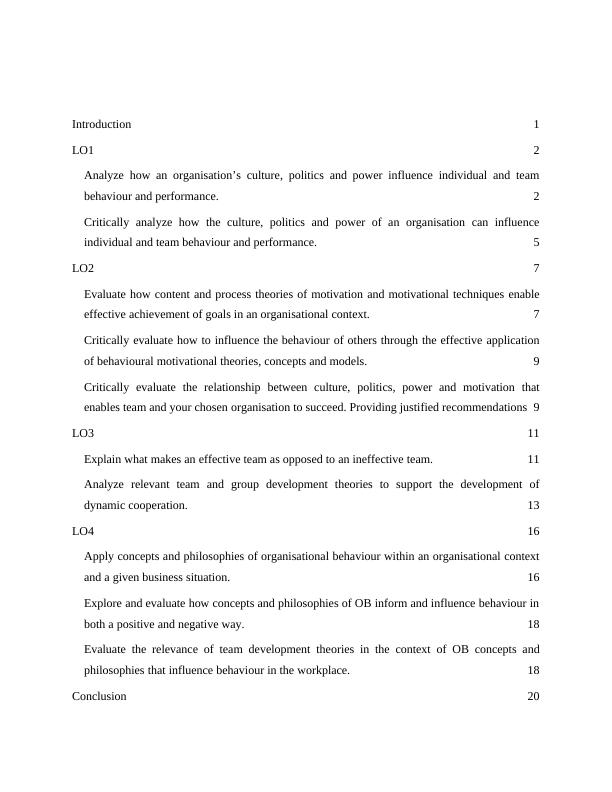
References21LIST OF FIGURESFigure 1: Handy’s typology model3Figure 2: Maslow Hierarchy of Needs8Figure 3: Goal Setting Theory8Figure 4: Stages in Tuckman model13Figure 5: Belbin team roles15Figure 6: Path goal theory16IntroductionIn the report, Sainsbury case study will be chosen who organisational behaviour (OB) will bediscussed in the report. The organisational behaviour is mainly human behaviour study in thesetting of the organisational an interface among an organisation as well as a human being. Theorganisational behaviour main goal and aim is to revitalize the theory of organisation as well asalso develop a better organisational life conceptualization. OB as the multidisciplinary field isinfluenced through development in numerous allied disciplines by including the engineering,economics, and psychology, sociology and practitioners experiences. In the report, a broadrange of theories and models will also be discussed, which helps an organisation to achievesuccess and productivity.
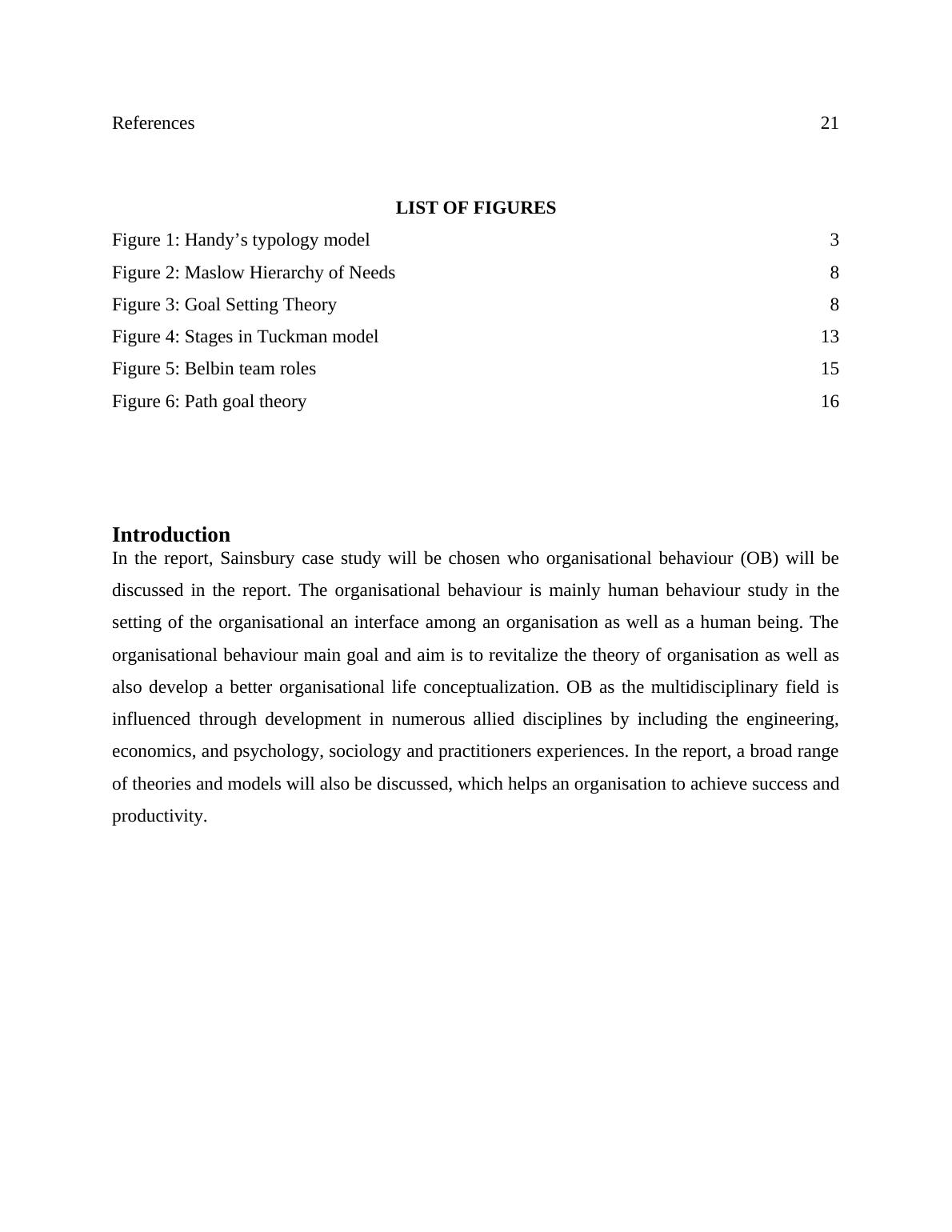
LO1Analyze how an organisation’s culture, politics and power influence individual and teambehaviour and performance. Evolution and history of organisational behaviour studyThe OB origin may trace their root back to the earlier organisational studies and Max Weber.The new form of organisation analysis, Max Weber, a sociologist, will describe the idealorganisation type which rested on legal principles as well as also enhances the technicalefficiency. With the arrival of Taylorism and scientific management in the year the 1890s, thestudied of organisational behaviour is forming it as academic disciplines. The scientificmanagement failure has given birth to the movement of human relations that is characterizedthrough an emphasis on employee morale and cooperation. The evolution of human relationsfrom year 1930s to 1950s will contribute mainly to shaping the studies of organisationalbehavior. In the year the 1960s to 1970s, this field becomes quantitative as well as producedthe ideas as resource dependence and informal organisation (Jiang et al., 2016). Theorganisational ecology, institutional theory and contingency theory are also enlarged. So in thestarting year of the 1980s the organisational change and organisation, the cultural explanationbecomes the various areas of the studies. Organisational cultureIt is defined mainly as an underlying way, belief, assumptions and values which contribute tounique physiology and social environment. The typology of Handy’s has defined the four kindsof organisational culture like task, role, power and person culture. He also has focused on therelationship between business organisation culture and structure. Sainsbury is the largestsupermarket chain located in the UK which has numerous employees. The Handy’s culturetypology is elaborated as follows:Person culture: In this culture, every person thinks itself as an essential aspect that isperforming the various task of an organisation in the context of achieving the organisational
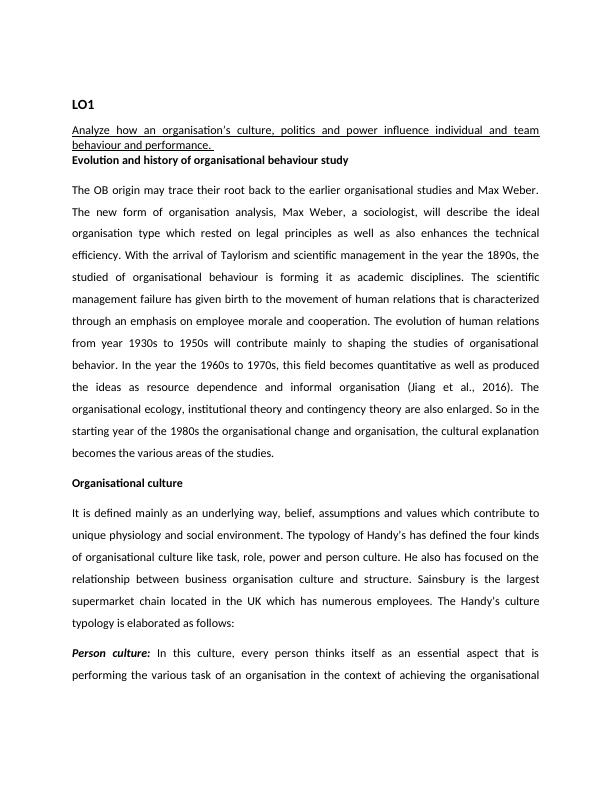
aims and goals. The person in this creates its team group in order to perform various tasksproperly as well as also has to focus in terms of achieving the personal and organisational goals.Power culture: In this culture, the organisation higher supervisor or authority has power inorder to give the order to its subordinates in terms of performing the allocated task properly. Ata similar time, in an organisation, the subordinates are more accountable to higher authorityrelated to assigned work to them. Role culture: In this culture, the role is defined that in an organisation each person isperforming the different types of work based on their capabilities and talents in terms ofachieving the aims and goals of the business (Jo and Park, 2016). In Sainsbury, the manager willperform the various functions as well as also take effective decisions in terms of coordinatingand controlling the employee performances and activities to achieve the business objectivesproperly. Task culture: In this culture, mainly, it focuses on the assigned task to get completed effectivelyon a given time through improving the employee performances by providing them with thenecessary training. So the Sainsbury leader and the manager give suitable training to itsemployees in terms of performing its task with their fill efforts and contributions. Figure 1: Handy’s typology model(Source: www.tutor2u.net, 2020)The earlier organisational culture within Sainsbury
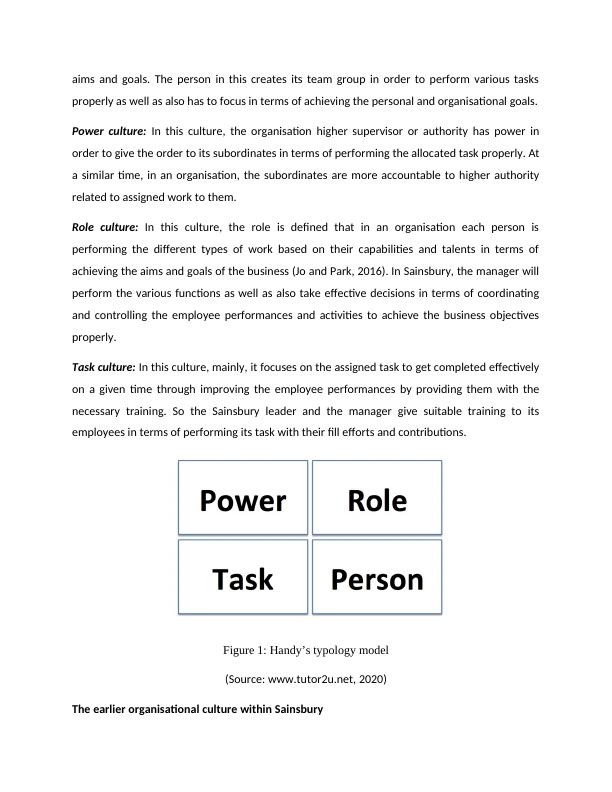
The organisational culture concept within Sainsbury in recent decades has gained wideacceptance because it is the main way to understand the human system properly. As fromperspectives of an open system, the organisational cultures, every aspect is being perceived asone of the essential conditions which affect the organisation subsystem and system. Sainsburynowadays is defined only by its organisational culture, and this is that something which canbreak or make the organisation. The organisation perception is being rooted in sociology andanthropology and also uses these terms in the context of defining the culture building blocks(Heravi and Gholami, 2018). It implies that the organisational change meet with two main basicchallenges that are integrating the individual as whole workable as well as also adopting anexternal environment to survive in a competitive environment.
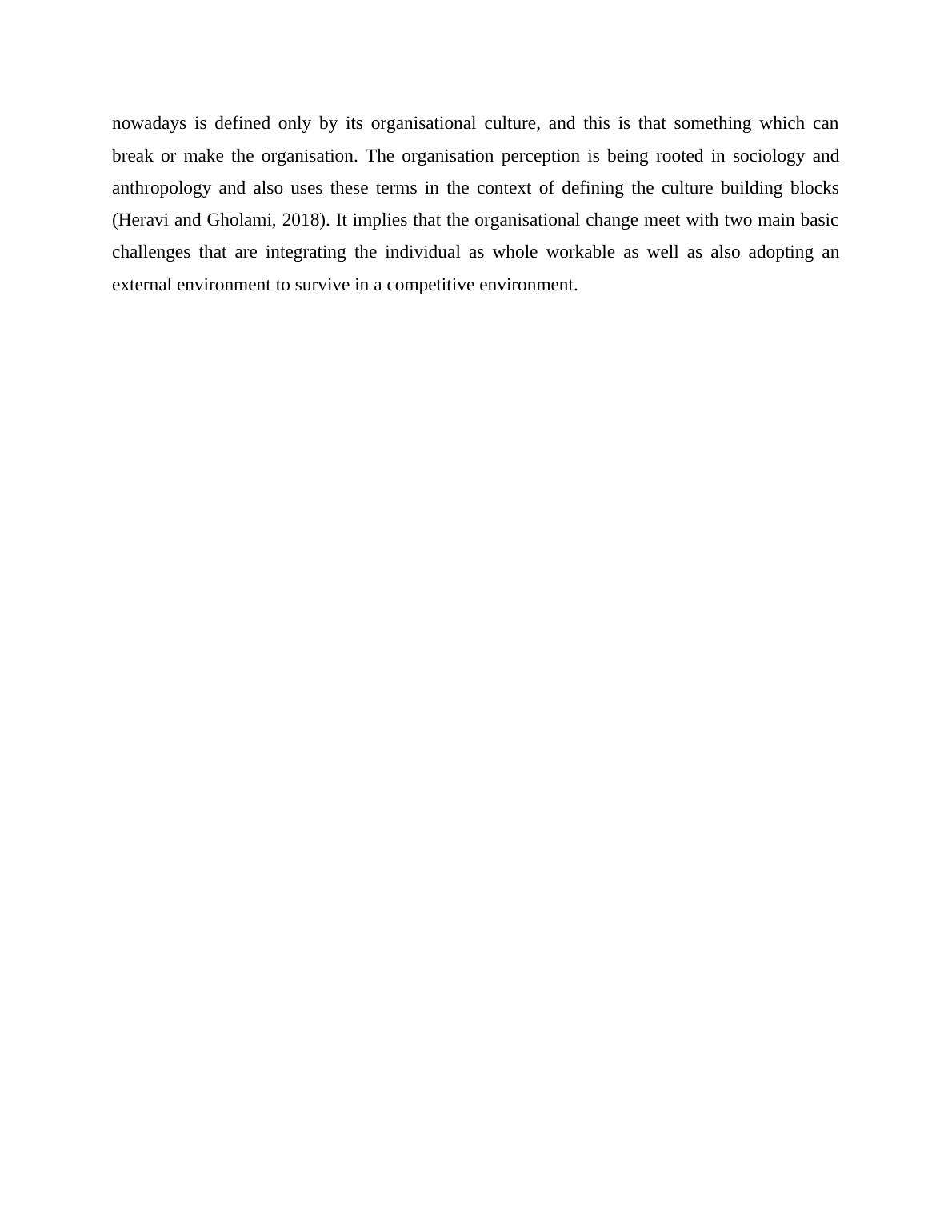
End of preview
Want to access all the pages? Upload your documents or become a member.
Related Documents
Influence of Organisational Culture, Politics, Power, and Motivation on Behaviour and Performancelg...
|21
|5745
|97
Organisation Behaviour Unit: 12lg...
|21
|7744
|266
Organisational Behaviourlg...
|19
|7061
|57
Organisational Behaviour: Influence of Culture, Power, Politics, Motivation, and Team Development on Performancelg...
|19
|5672
|402
Organisational Behaviour Concepts and Philosophies Assignmentlg...
|24
|4980
|59
(pdf) Organisational Behaviour Assignment Samplelg...
|27
|4851
|207